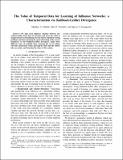The value of temporal data for learning of influence networks: A characterization via Kullback-Leibler divergence
Author(s)
Zoumpoulis, Spyros I.; Dahleh, Munther A; Tsitsiklis, John N
DownloadThe value of temporal data.pdf (613.6Kb)
OPEN_ACCESS_POLICY
Open Access Policy
Creative Commons Attribution-Noncommercial-Share Alike
Terms of use
Metadata
Show full item recordAbstract
We infer local influence relations between networked entities from data on outcomes and assess the value of temporal data by formulating relevant binary hypothesis testing problems and characterizing the speed of learning of the correct hypothesis via the Kullback-Leibler divergence, under three different types of available data: knowing the set of entities who take a particular action; knowing the order that the entities take an action; and knowing the times of the actions.
Date issued
2016-02Department
Massachusetts Institute of Technology. Department of Electrical Engineering and Computer Science; Massachusetts Institute of Technology. Institute for Data, Systems, and Society; Massachusetts Institute of Technology. Laboratory for Information and Decision SystemsJournal
2015 54th IEEE Conference on Decision and Control (CDC)
Publisher
Institute of Electrical and Electronics Engineers (IEEE)
Citation
Dahleh, Munther A., John N. Tsitsiklis, and Spyros I. Zoumpoulis. “The Value of Temporal Data for Learning of Influence Networks: A Characterization via Kullback-Leibler Divergence.” 2015 IEEE 54th Annual Conference on Decision and Control (CDC), Osaka, Japan, 15-18 December, 2015. IEEE, 2015. 2907–2912.
Version: Author's final manuscript
ISBN
978-1-4799-7886-1